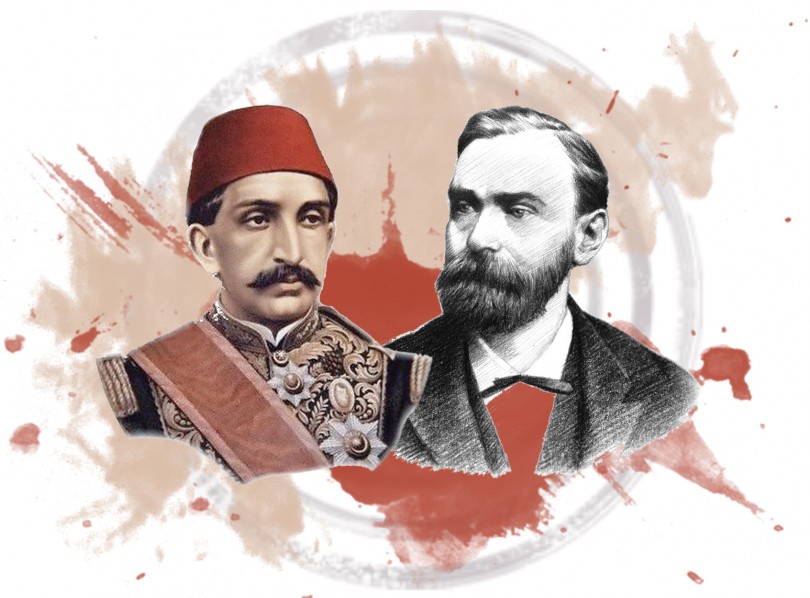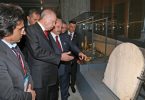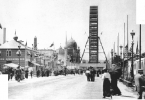Although once there were efforts to label the Ottoman State as “The Sick Man”, Western countries did not overlook the steps taken towards institutionalization and technical moves made. Both Ottoman citizens and Western inventors aspired to obtain patents from the Ottoman due to incentives aimed at inventions and discoveries with the
advances, and the state systematically monitored the activity. Ottoman State was invited for the Nobel Awards ceremony being held for the first time in 1901, which was an indication of this activity.
FIRST INVITATIO N TO OTTOMA N
Translated by Stockholm Ambassador Şerif Pasha from French, the official document dated 29 August 1900 was sent to the Ottoman State. The document sealed by King Oscar on 29 June 1900 stated that cash prizes would be awarded to technical and scientific works by the Nobel Institute, and prizes were the primary function for which the charter was established. Şerif Pasha specifically expressed his pride in presenting the Sultan with these documents in French from the Ministry of Foreign Affairs. Document Noannounced Nobel Institute’s decision to give the award for the first time with a ceremony on 10 December 1901, on the condition that award-worthy relevant works are sent.
The content of the award is elaborated in another document sent to Ministry of National Education, signed by Ahmet
Tevfik Pasha from Ministry of Internal Affairs on 17 September 1900. It was stated that particularly scientists with
pivotal inventions and discoveries in the fields of natural and medical sciences, with works of significance in
literature and figures with contributions in international peace will be granted with prize money each year. This prize
money would be awarded to those who fulfil the conditions specified in Nobel’s will, and the possessions allocated would be used in the designated way. Ministry of National Education Censorship Committee member Kalavasi Effendy received the documents mentioned above on 22 September 1900 and these transcripts were memorized to be delivered to the record office. A month later, on 22 October 1900, another information regarding the ceremony
was included in the document sent to Ministry of Foreign Affairs translation bureau by Swedish and Norwegian
Embassies. Document stated that the Foundation titled Nobel was approved by the King on 12 July 1900, copies of charter’s French translations were attached with permission from state’s printing house, and the content of the Nobel charter concerning all world countries should be globally advertised.
The document addressed to Ministry of National Education was signed by Minister of Foreign Affairs Ahmet Tevfik
Pasha on 24 September 1900, and refers to the content of Alfred Nobel’s will, the conditions regarding the
utilization of possessions allocated for the awards and requirements to fulfil. In another document dated 29 October
1900 it was requested that the same issues were shared with Ministry of Internal Affairs, and the document to be immediately delivered to Ministry’s official documents bureau clerk Zarif Bey. Another document sent to Ministry
of Foreign Affairs by Swedish and Norwegian embassies on 19 December 1900, states that the members of the
association established to execute Alfred Nobel’s will are authorized to directly meet with other state officials. The
correspondence between the Ottoman State and the Nobel Foundation concerning the awards controlled by Swedish and Norwegian governments, points to the friendly relations between these countries.
NOBELS IN OTTOMA N PRESS
Aside from the correspondence between the Ottoman State and Swedish Embassy, Nobel Prizes were widely covered by the Ottoman press. Printed media organ of the period, ‘Asır’ newspaper announced the prizes with the title “Determination is an Award” as follows: There are various science prizes awarded in Europe however Nobel Prizes precede all. A wealthy man from Stockholm, Alfred Nobel had a fortune of 55 million Franks at the time of his assing. Each prize has a sum of 15 thousand Turkish Liras in that period, the total would amount to 75 thousand Turkish Liras. ‘Servet-i Fünun’ magazine published the photos of the first six Nobel laureates in 1901, as well as the fields
they received awards in and the content of the awards. Newspaper also featured the will written by Alfred Nobel before his passing. In his will, Nobel requested that executors liquidate his fortune to deposit in reliable banks or purchase valuables such as stocks, and grant the annual interest of the wealth to services or discoveries in that year, and to those with major contributions to humanity. The Swedish Academy is responsible for choosing Nobel laureates in natural sciences, literature and chemistry. Stockholm Academy takes a vote for the medical prize. The last prize is awarded after the vote and decision of five people selected by the Swedish Parliament. Alfred Nobel stated his primary request as follows: The awards will be granted based on merit, without regard to gender or faith.
Nobel laureates covered in Ottoman media were inventor of X-ray German Wilhelm Conrad Roentgen in physics,
Jacobus H. van’t Hoff in chemistry, another German Emil Adolf von Behringin medicine, French Academy faculty
member Sully Prudhomme in literature, and Henry Dunant and Frederic Passy for their contributions in world eace.
A newspaper of the period ‘Mecmua-i Edebiyye’ referred to these six names, and another newspaper ‘Terakki’ provided detailed information on X-rays and Roentgen. Various newspapers and magazines of the period provided indepth information on Nobel with titles ‘Nobel Prize’ or ‘Storting Club’. The Nobel prizes awarded in the following
years were covered by the media as well as the first prizes.
NOBEL LAUREATES BORN IN OTTOMA N TERRITORIES
Nobel Prizes were awarded for the first time in 1901. Ottoman citizens who applied for the prizes are not stated in
any of the documents in the archive. However there have been five Nobel laureates born in Ottoman territories. Born in 1892 in Travnik, today within the boundaries of Bosnia-Herzegovina, Ivo Andric was an Ottoman citizen. Known for his novel ‘The Bridge on the Drina’, winner of 1961 Nobel Prize in Literature Ivo Andric dealt with the journey of the people in Balkan region under Ottoman rule over Drina River, a major point in the Balkans for the Ottoman State for a long period of time. Andric never distanced himself from the Ottoman and completed his doctoral degree in 1924 in Graz University with his thesis titled ‘Die Entwicklung des geistigen Lebens in Bosnien ünter der Einwirkung der türkischen Herrschaft’ which was later published in English with the title ‘The Development of Spiritual Life in Bosnia under the Influence of Turkish Rule’. Andric passed away in Belgrade in 1975, at the age of 83.
Another name was Yorgo (Giorgos) Seferis born to a Greek family in 1900 in Urla, when Izmir was still Ottoman territory. Seferis who lived in Izmir for 14 years, later migrated to Athens with his family. He could not return to Izmir until 1950. Seferis won the Nobel Prize in Literature in 1963, 47 years after he moved to Athens. He served in the Ministry of Foreign Affairs in Ankara between years 1948 and 1950. Seferis worked as an undersecretary in embassies in various countries and contributed in the independence process in Cyprus in 1959. Seferis passed away in Athens on 20 September 1971.
Elias Canetti was born on 25 June 1905 in Ruse, Bulgaria once under Ottoman rule, as the son of a Jewish merchant family. He was a scientist raised in Ottoman lands. He migrated to Manchester with his family in 1911, and was forced to flee to London during Nazi invasion of Austria. Canetti received numerous awards for his literary works, and became a Nobel laureate in 1981 at the age of 76. He passed away in Zurich in 1994.
A familiar name from the recent period is Orhan Pamuk. Pamuk was born in Istanbul in 1952, and was deemed worthy of the prize in 2006. Pamuk shared a sad memory about his father in his acceptance speech titled ‘My Father’s Suitcase’ which moved the audience. Pamuk received various other awards next to the Nobel Prize.
The latest Nobel laureate born in this country is Aziz Sancar, born in Savur district of Mardin on 8 September 1946.
He entered Istanbul Faculty of Medicine in 1963 which he graduated from in 1969, and worked as a physician in the
Savur community clinic for two years. Sancar specialized on DNA repair, and during his doctoral degree, he invented a basic technique he named Maxicell which can be translated into Turkish as “Big Cell” to be utilized in genetic engineering. This technique he invented is used for detection of proteins produced by cloned genes. With this work, he became a leading figure who contributed in development of genetic engineering in USA.
Sancar’s study Maxicell is a two-pages long article however it has been cited for more than 1000 times. In addition,
Sancar has made six inventions which have made it to the history of science. Sancar who received the Nobel Prize in
Chemistry from Swedish King Carl XVI Gustaf in December 2015, is the first Turkish citizen to win this award in this
field of science. Sancar has received numerous other awards.
Sancar is married to Gwen Boles Sancar who is also a biochemistry professor and a faculty member. He established
Aziz&Gwen Sancar Foundation with his wife to assist Turkish students studying in USA and to further Turkish-
American relations. Foundation runs the “Carolina Turkish House” student guesthouse in North Carolina State in
the USA.
The Ottoman State was formally invited to the first ceremony held in 1901 which was a major development. In addition, Ottoman media covering Nobel Prizes almost every year indicates that Ottoman was not indifferent
towards the advancements in the West. Correspondence regarding Nobel Prizes with Stockholm Embassy was continued also in the Republic Period. The names deemed worthy of the Prize by the Grand National Assembly of Turkey in the Republic Period, are in Republic Archives. Only the invitation letters for Nobel Prize ceremonies are registered in the Ottoman Archives.
FOOT NOTE :
• Başbakanlık Osmanlı Arşivi, Maarif Nezareti
Mektubi Kalemi, File No: 535/50
• Hariciye Salnamesi (1900), Matbaa-i
Osmaniye.
• Maarif Salnamesi (1900), Matbaa-i Amire.
• Asır, issue 642.
• Mecmua-i Edebiyye, issue 60.
• Servet-i Fünun, issue 558.
• Musavver Terakki, issue 22.
• A. Erol Göksu, Nobel Ödüllü Edebiyatçılar,
October 2007.
• Cumhuriyet Bilim ve Teknoloji Magazine,
issue 1500.
• Betül Kayahan, Nobelli 3 Osmanlı, Derin
Tarih, Issue 46 (Also see Mustafa Armağan,
Nobelli Osmanlı yazarlarının sayısı 3’e çıktı)
* Researcher, Historian (Istanbul Medeniyet
University M.A.)









Leave a Comment